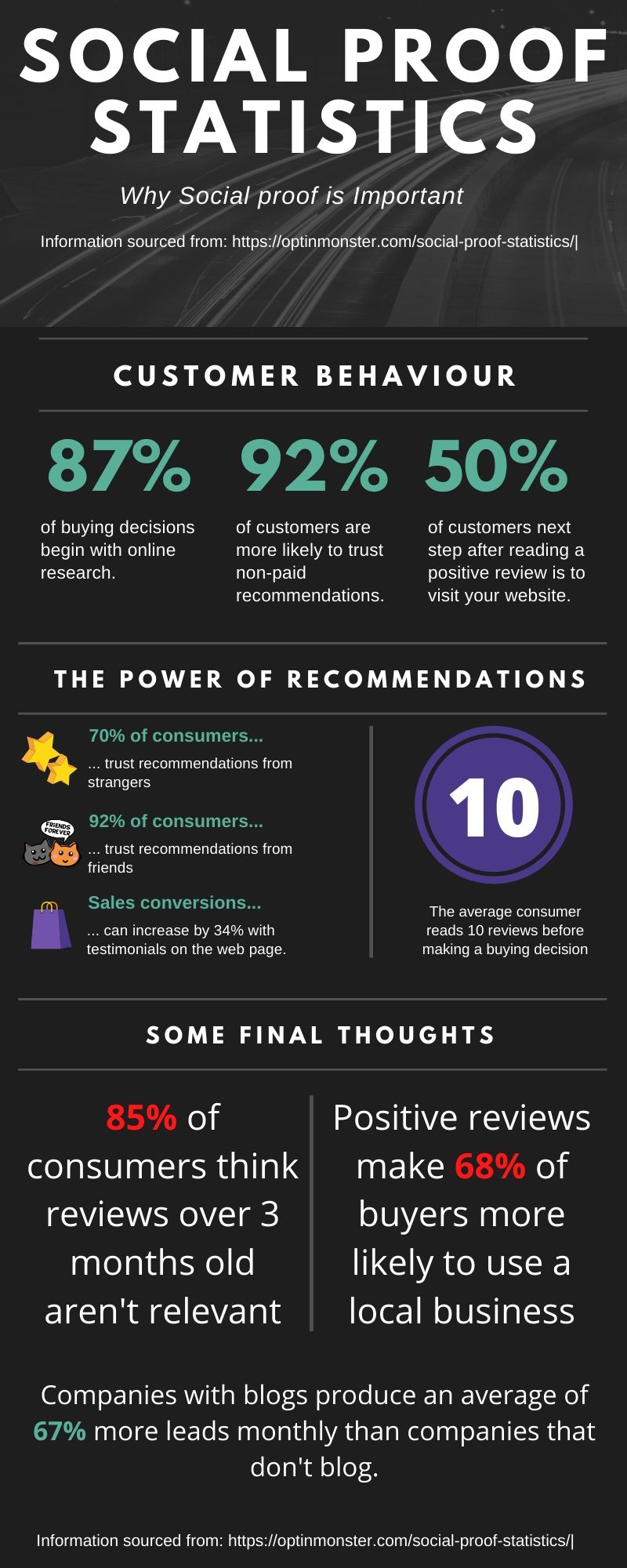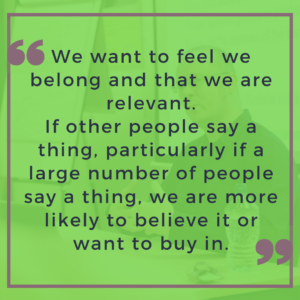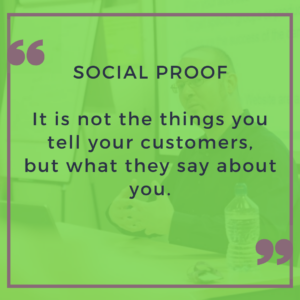Social Proof is not New
The idea of social proof has been around to many years and is not a digitally exclusive idea. Simply social proof is the things that show others that you are capable and competent. Critically it is not the things you tell them, but what others say about you.
20-30 years ago this was word of mouth, for a long time Marks and Spencer didn't advertise because their word of mouth (social proof) was so strong.
Social proof is particularly valuable in the digital age because it's much easier to gain positive (and negative) results.
During the current lockdown with such a huge increase in digital activity, there has never been a better time to develop this facet of your business.
So What is Social Proof?
It is anything that proves to others that you are credible and expert in what you do. The difference to normal marketing channels is that this proof is not created, in the main, by you.
It's created by your customers, statistics, qualification and certifications. Any impartial source that talks you up can be social proof.
The statistics speak for themselves.
- 92% of customer are more likely to trust non-paid recommendations
- Ave customer reads 10 reviews before making a decision
- 70% of customers trust recommendations from strangers
- 92% of customers trust recommendations from a friend

What Creates Social Proof?
This works because of some very particular human behaviours.
- Our desire to fit in.
- FOMO (Fear of Missing out)
- Herd Mentality
We want to feel we belong and that we are relevant. If other people say a thing, particularly if a large number of people say a thing, we are more likely to believe it or want to buy in. A Twitter, Instagram or Facebook page with a large number of followers will be seen as more credible that one without.
In our digital marketing, there are a number of things we can do to encourage this.
Collaborations
collaborating with other individuals is a good way to start. We are introduced to their followers (who already trust them) as an expert or credible source. This second-hand recommendation can get you more followers and leads.
Positive Interaction
Interact with your customers. Retweet them, comment on their posts, thank them for contributing. This makes them more positive towards you, but others seeing these posts will also be influenced by your positive attitude.
Advocacy
We will talk about other forms of advocacy in a moment. In this case, I am talking about, Likes, Shares Comments (from customers). Good quality, interesting and informative content will get a thumbs up or a share. Someone seeing a post with a like or comment is more likely to trust it (Herd Mentality).
Recommendations
If a customer takes the time and trouble to tell you how great they think you are, use it. Pop testimonials on your website (testimonials on a webpage can increase sales conversion by 34%). Don't be afraid to ask for them. Email or use a site like Video Ask to request them.
Reviews
Whether it is on Amazon, eBay, Google My Business or Facebook a review can and will make a difference in buying decisions. They may happen organically or as with recommendations you can ask for them.


Qualifications, Certifications and Awards
If you have qualifications and certifications, talk about them and use them in relevant content. This is something you have earned and has been awarded by an independent body. People trust that.
Also if you have won an award related to your business celebrate it. You've earned it and it's a great source of social proof.
Other Things to Prove Your Value
Celebrate a milestone, 5 years in business, 1000 twitter followers, first new employee etc.
Give advice and support in your content, posts designed to add value and build trust.
Posts from Staff (if you have them) are seen as more authentic and trustworthy.
If you are really feeling brave... LiveStream! 17% of LiveStream viewers see this content as more authentic.
Be Brave and Engage
Some of this may well happen organically, a couple of months ago I got a lovely recommendation appeared on my LinkedIn profile. I didn't ask for it the client just wanted to say something positive about my training (I shared the heck out of that). Just last week, out of the blue, I got a message from a former client saying how much she loved my courses, all I'd done was like and share some of her posts (positive interaction). Liking and sharing her posts wasn't a cynical attempt to get good feedback, I genuinely wanted to share them. However, the result was a nice bit of organic social proof.
But these are the exceptions. We need to actively seek social proof by:
- Asking customers for recommendation, testimonials and case studies.
- Keeping our interactions positive, helpful and customer-centric.
- Building relationships that are simply more than a means to separate our customers from their money.
It's Marketing that you don't Pay for but is Priceless.
87% of buying decision start with online research.
- If our social media is positive, inclusive and contains comments, likes and shares, we get more trust.
- If case studies and review show us in a positive light, we get more trust.
- If reviews and collaborations show that we are credible, we get more trust.
Trust get you sales!
Most of this type of content costs nothing but has a greater return than anything you could ever pay for.
Be authentic, positive, customer focussed and provide useful relevant content. This alongside a good relationship with your customers will add a huge amount of value.
Further Reading and Helpful Tools
All statistics were taken from the following article - Social Proof Statistics: Powerful Facts That Will Help You Boost Your Brand
To request feedback and gain testimonials try:
- Video Ask
- Google Forms
- Google My Business (if you have a physical location or cover a specific area)
- LinkedIn Recommendations
The Law of Diffusion of Innovation
This is a fantastic model that is so useful in sales and marketing. It is too big a subject to cover here. But I've popped a video explaining it to help out and a link to a Ted Talk by Simon Sinek that I think you will find useful.
How Can I Help You?
I am a business advisor and digital marketing trainer fully online ready. If you would like to learn more, use the button to get in touch.